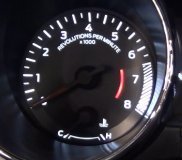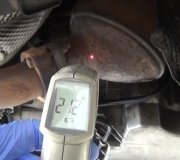1. HO2S sensors are not likely to be the cause of adaptive DTCs P0171, P0172, P0174, P0175: Most warranty-returned HO2S sensors (replaced for these DTCs) are found to function normally. Additional related DTCs will normally be present if there is a concern with the HO2S sensors. Do not replace an HO2S sensor unless verified through pinpoint diagnostic tests found in the PC/ED Service Manual.
2. DTCs P0171, P0172, P0174, and P0175 are not related to downstream HO2S sensors: When diagnosing a vehicle with a MIL On and DTC(s) P0171, P0172, P0174, and/or P0175 in continuous memory, do not replace the downstream HO2S sensors. These DTCs have no connection to the downstream HO2S sensor function nor its diagnosis for faults. Always verify the vehicle concern, then perform the pinpoint diagnostics from the appropriate PC/ED Service Manual.
3. Diagnosing lean conditions and lean DTCs P0171, P0174: Freeze Frame Data can often help to identify the type of lean condition, even if the fault is intermittent, by indicating how the vehicle was being driven when the fault occurred. Diagnosis of lean conditions and lean adaptive DTCs can be difficult, especially if the concern is intermittent. Verifying the concern is extremely important. There are different types of lean conditions. The ability to identify the type of lean condition causing the concern can be crucial to a correct diagnosis. When DTCs P0171 and P0174 are both present, there is a strong likelihood of another concern being present: a. Vacuum leaks/unmetered air: In this type of condition, the engine may actually run lean of stoichiometry (14.7:1 air/fuel ratio) if the PCM is not able to compensate enough to correct for the condition. This condition is typically caused by air entering the engine through an abnormal source (opening), or due to a MAF malfunction. In this situation, the volume of air entering the engine is actually greater than what the MAF is indicating to the PCM. Vacuum leaks will normally be most apparent when high manifold vacuum is present, during idle or light throttle. If Freeze Frame Data indicates that the fault occurred at idle, a check for vacuum leaks/unmetered air when the engine is cold might be the best starting point.
Examples: Loose, leaking or disconnected vacuum lines, intake manifold gaskets or O-rings, throttle body gaskets, brake booster, air inlet tube, stuck/frozen/aftermarket PCV valve, unseated engine oil dipstick, MAF reading lower than normal, etc.
B. Insufficient fueling: In this type of condition, the engine may actually run lean of stoichiometry (14.7:1 air/fuel ratio) if the PCM is not able to compensate enough to correct for the condition. This condition is typically caused by a fuel delivery system concern that restricts or limits the amount of fuel being delivered to the engine. This condition will normally be most apparent when the engine is under a heavy load, when a higher volume of fuel is required. If Freeze Frame Data indicates that the fault occurred under a heavy load, a check of the fuel delivery system (checking fuel pressure with engine under a load) might be the best starting point.
Examples: Low fuel pressure (fuel pump, fuel filter, fuel leaks, restricted fuel supply lines), fuel injector concerns, etc.
C. Exhaust system leaks: In this type of condition, the engine may actually be running near stoichiometry (14.7:1 air/fuel ratio), but the exhaust gas mixture will be lean. This condition is caused by oxygen-rich air entering the exhaust system through an external source. This condition will cause the exhaust gas mixture to be lean, even though the actual combustion in the engine may not be.
Examples: Exhaust system leaks upstream or near HO2S, malfunctioning Secondary Air Injection system.
D. MAF concerns
Saturday, August 22nd, 2020 AT 10:26 AM
(Merged)


